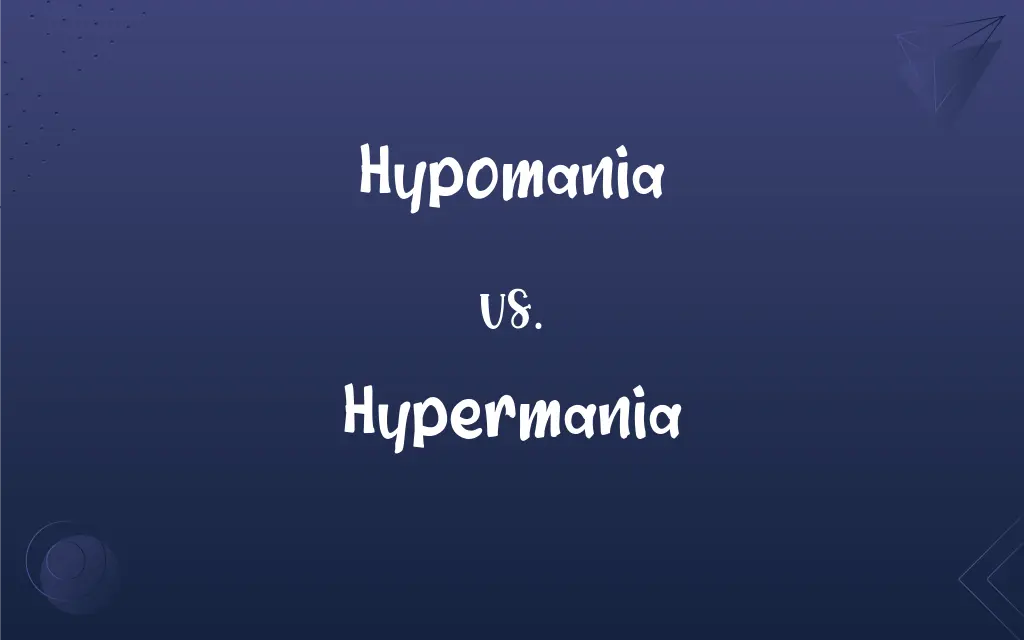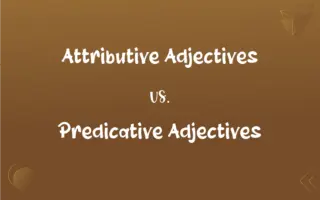Hypomania vs. Hypermania: What's the Difference?
Edited by Aimie Carlson || By Janet White || Published on July 15, 2024
Hypomania is a milder form of mania with less severe symptoms, while hypermania is an informal term often used to describe extreme or intense mania.

Key Differences
Hypomania is characterized by an elevated mood, increased energy, and activity levels that are noticeable but not severe enough to cause significant impairment in daily functioning. Hypermania, which is not a widely recognized term in clinical settings, is often used colloquially to describe extremely high levels of mania with intense symptoms that greatly disrupt a person's life.
In hypomania, individuals may experience heightened creativity, productivity, and sociability, often feeling good and functioning well, which can make the condition hard to recognize as problematic. In contrast, what might be referred to as "hypermania" would involve extreme behaviors, such as reckless decisions, delusions of grandeur, and a complete break from reality, necessitating immediate medical intervention.
Hypomanic episodes are typically shorter in duration and less disruptive than manic episodes, with symptoms lasting at least four consecutive days. The term "hypermania" implies an exaggerated form of mania, where symptoms are so severe that they require hospitalization to prevent harm to oneself or others, and the episode may last significantly longer.
Individuals with hypomania can often continue with their daily activities without significant issues, and their mood elevation can sometimes be perceived positively by others. However, the extreme behaviors associated with severe mania, sometimes referred to as "hypermania," can lead to serious consequences, including financial, legal, and interpersonal problems.
Hypomania does not usually involve psychosis, whereas severe mania (which might be informally referred to as "hypermania") can include psychotic symptoms such as hallucinations and delusions, making it far more dangerous and debilitating for the individual experiencing it.
ADVERTISEMENT
Comparison Chart
Severity
Mild elevation in mood and energy, not severe
Extreme elevation in mood and energy, very severe
Impact on Functioning
Minimal or no impairment in social or occupational areas
Significant impairment, often requires hospitalization
Duration
At least 4 consecutive days
Variable, can be prolonged
Psychotic Features
Typically absent
May be present during severe episodes
Need for Hospitalization
Rarely required
Often necessary to prevent harm and manage symptoms
ADVERTISEMENT
Hypomania and Hypermania Definitions
Hypomania
A mild form of mania characterized by elevated mood and energy.
During her hypomanic episode, she completed numerous projects with boundless energy.
Hypermania
Extreme impulsivity or rash decision-making.
Her hypermania led her to impulsively purchase a car without considering the cost.
Hypomania
Can lead to risky behaviors, but less severe than in full mania.
In her state of hypomania, she impulsively started a small business.
Hypermania
Intense restlessness or agitation.
The hypermania caused him to pace around the room constantly, unable to sit still.
Hypomania
Often presents as increased sociability, talkativeness, and confidence.
His hypomania made him the life of the party, chatting and socializing with everyone.
Hypermania
Overly heightened mood or euphoria.
During his hypermania, he felt an unrealistic sense of happiness and invincibility.
Hypomania
Does not involve psychosis and is less likely to cause significant life disruption.
Despite his hypomania, he maintained his daily routine without major issues.
Hypermania
Abnormally increased activity or productivity.
In her state of hypermania, she completed weeks' worth of work in just a few days.
Hypomania
Often seen in bipolar II disorder, where it alternates with depressive episodes.
Her hypomania contrasted sharply with her depressive periods, creating a cycle of highs and lows.
Hypermania
Excessive enthusiasm or energy.
His hypermania was evident as he worked tirelessly on his project for hours.
Hypomania
An abnormal psychological state that is similar to but milder than mania, characterized by an elevated or agitated mood and commonly occurring in people with bipolar disorder.
Hypermania
An extreme form of mania.
Hypomania
(medicine) A mild form of mania, especially the phase of several mood disorders characterized by euphoria or hyperactivity.
FAQs
What is hypomania?
Hypomania is a milder form of mania characterized by elevated mood, increased energy, and productivity without significant impairment in daily functioning.
How long does a hypomanic episode last?
Hypomanic episodes last at least four consecutive days, shorter than severe manic episodes.
What does the term "hypermania" refer to?
"Hypermania" is not a clinically recognized term; severe manic episodes are simply referred to as "mania" in psychiatric contexts.
Can someone with hypomania function normally?
Yes, many people with hypomania can continue their daily activities and may even be more productive during an episode.
How does hypomania differ from mania?
Hypomania is less severe than mania, with symptoms that are noticeable but not severe enough to cause major impairment in social or occupational functioning.
Are there psychotic features in hypomania?
No, psychotic features such as delusions or hallucinations are not typically present in hypomania.
Is hypomania a sign of bipolar disorder?
Yes, hypomania is often associated with bipolar II disorder, where it alternates with periods of depression.
Can hypomania lead to hospitalization?
Hypomania rarely requires hospitalization as it is less severe and less disruptive than full mania.
Is hypomania always easy to recognize?
Not always, as the symptoms can sometimes be subtle and may be perceived by others as simply a good mood or increased energy.
What triggers hypomanic episodes?
Triggers can include stress, lack of sleep, medication changes, and substance use, among others.
Can hypomania turn into mania?
Yes, without proper treatment, hypomanic episodes can escalate into full manic episodes.
How is hypomania treated?
Treatment may include mood stabilizers, psychotherapy, and lifestyle changes to manage symptoms and prevent progression to mania.
Can hypomania affect relationships?
Yes, the increased energy and impulsivity associated with hypomania can strain personal and professional relationships.
What should someone do if they suspect they are experiencing hypomania?
It's important to consult a mental health professional for an assessment and discussion of potential treatment options.
Can hypomania be beneficial?
Some individuals may experience increased creativity and productivity during hypomanic episodes, but it can also lead to risky behaviors and eventually more severe mood episodes.
Can medication for hypomania have side effects?
Yes, like all medications, those used to treat hypomania can have side effects, which should be discussed with a healthcare provider.
How do healthcare professionals diagnose hypomania?
Diagnosis involves a clinical assessment of symptoms, medical history, and sometimes interviews with family members to understand changes in behavior.
Are there lifestyle changes that can help manage hypomania?
Yes, maintaining a regular sleep schedule, avoiding alcohol and drugs, managing stress, and staying on a routine can help.
Is it possible to have hypomania without experiencing depression?
While hypomania is often part of a bipolar disorder cycle that includes depression, it is possible to experience hypomanic episodes without significant depressive episodes.
How do friends and family typically perceive hypomania?
They may notice a change in behavior, such as increased energy and activity, but may not always recognize it as a psychiatric condition.
About Author
Written by
Janet WhiteJanet White has been an esteemed writer and blogger for Difference Wiki. Holding a Master's degree in Science and Medical Journalism from the prestigious Boston University, she has consistently demonstrated her expertise and passion for her field. When she's not immersed in her work, Janet relishes her time exercising, delving into a good book, and cherishing moments with friends and family.
Edited by
Aimie CarlsonAimie Carlson, holding a master's degree in English literature, is a fervent English language enthusiast. She lends her writing talents to Difference Wiki, a prominent website that specializes in comparisons, offering readers insightful analyses that both captivate and inform.






































































